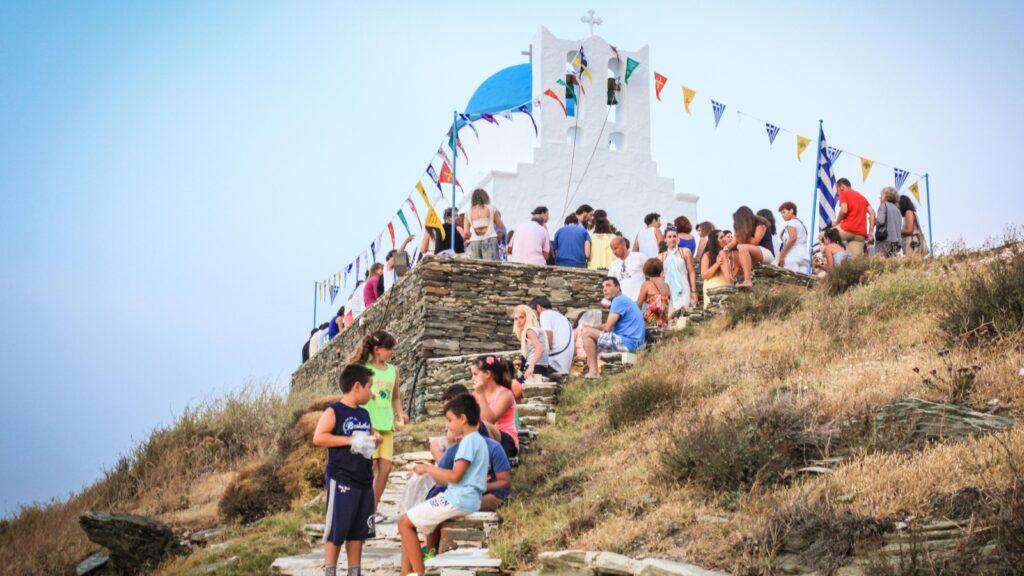In the east corner of the Mediterranean lies a very green and mountainous island. “Welcome to the island of Icarus,” a sign reads.
In Greek mythology, Icarus is the son of the master craftsman Daedalus, who was flying too close to the sun in his failed attempt to escape Crete. Ikaria island was named after him and is the place most known for its long-living inhabitants. It is also widely famous for the biggest Paniyiri festivals in the whole of Greece.
Dancing in circles, drinking wine, and eating local delicacies, all while listening to renowned violinist Nikos Fakaros playing uplifting music to the smiling crowds, may be the ritual most Greeks have been waiting for all year. Especially because there was a two-year hiatus on all festivals and celebrations due to the pandemic.
The orange sun had set a while ago and had left a magical purple brush behind, which was followed by August’s supermoon which was now shining bright above the hills.
I was heading to Stavlos, a small village of 13 habitants. Its name means barn or stable. It was kind of ironic, I thought, since I was going to attend the first vegan Paniyiri, an alternative first for the popular Greek traditional feasts, where lots of meat is normally served.
‘We achieved all of this without animals getting hurt’
It is a historic time: Ikaria is a primarily meat-eating island. I couldn’t believe my eyes when I reached the spot under the plane trees, next to a stream where the festival was taking place. Every day, a different cultural association in Ikaria organizes its own festival.
That day, Aether and Earth, an animal welfare association, organized the first vegan Paniyiri and invited a vegan chef to cook cruelty-free and delicious dishes at an all-you-can-eat buffet.
The Dionysian atmosphere was for a good cause too; all the proceedings would go for the Ikarian stray animals’ care. I grabbed a huge tray and filled it with soufiko, a local dish, vegan sausages, and no-tuna pasta, along with the famous vegan tzatziki, some salad, and lots of local wine.
The big portions of food were a good fit for the all-night feast that took place in the middle of August. Everyone was drinking wine and dancing to the violin, trying to follow the sometimes difficult steps of the traditional ‘Ikariotiko’ dance. Elisavet Vlahaki, the president of the association Aether and Earth, appeared in the center of the dancing circle in order to thank everyone for being there.
“This Paniyiri has a message and a purpose. I dare to ask; Are we happy? Do we have abundance? We managed to achieve all of this without any animal getting hurt,” she said. Even the wine was vegan and locally made by Mr. Halvas.
Is Greece changing?
“When all the Ikarians meet, look how they have fun,” the song continued. Nikos Gaitanos—one of the first chefs who tried to cook everything vegan and has designed menus for many different restaurants in Greece—was behind the buffet with the different kinds of plant-based options.
“It’s the biggest amount of food I have ever prepared in my life. I am very delighted because it all happened for a good cause. When I was asked to cook for the vegan Paniyiri of Ikaria, my first thought was that it was a contribution to the care of the island’s stray animals.”
“In retrospect, I realized how radical it is for a country with a strong tradition of meat eating, especially in festivals, to organize such an event, let alone in the place that is intertwined with the festivals, the island of Ikaria!”
“In addition to this historical event for Greece, it was a very beautiful experience for those who took part in the event, but also for all the participants who honored us en masse with their presence,” he concluded happily.
Going to the first vegan Paniyiri in Ikaria was the perfect example to show the paradigm shift and that Greece, along with the rest of the world, is moving towards a cruelty-free, vegan, and more sustainable diet and lifestyle.
Ikaria showed the world that even the most hardcore meat-eaters can be happy eating plant-based while doing what they love the most; enjoying life. Thus, animals were free to enjoy life too.






